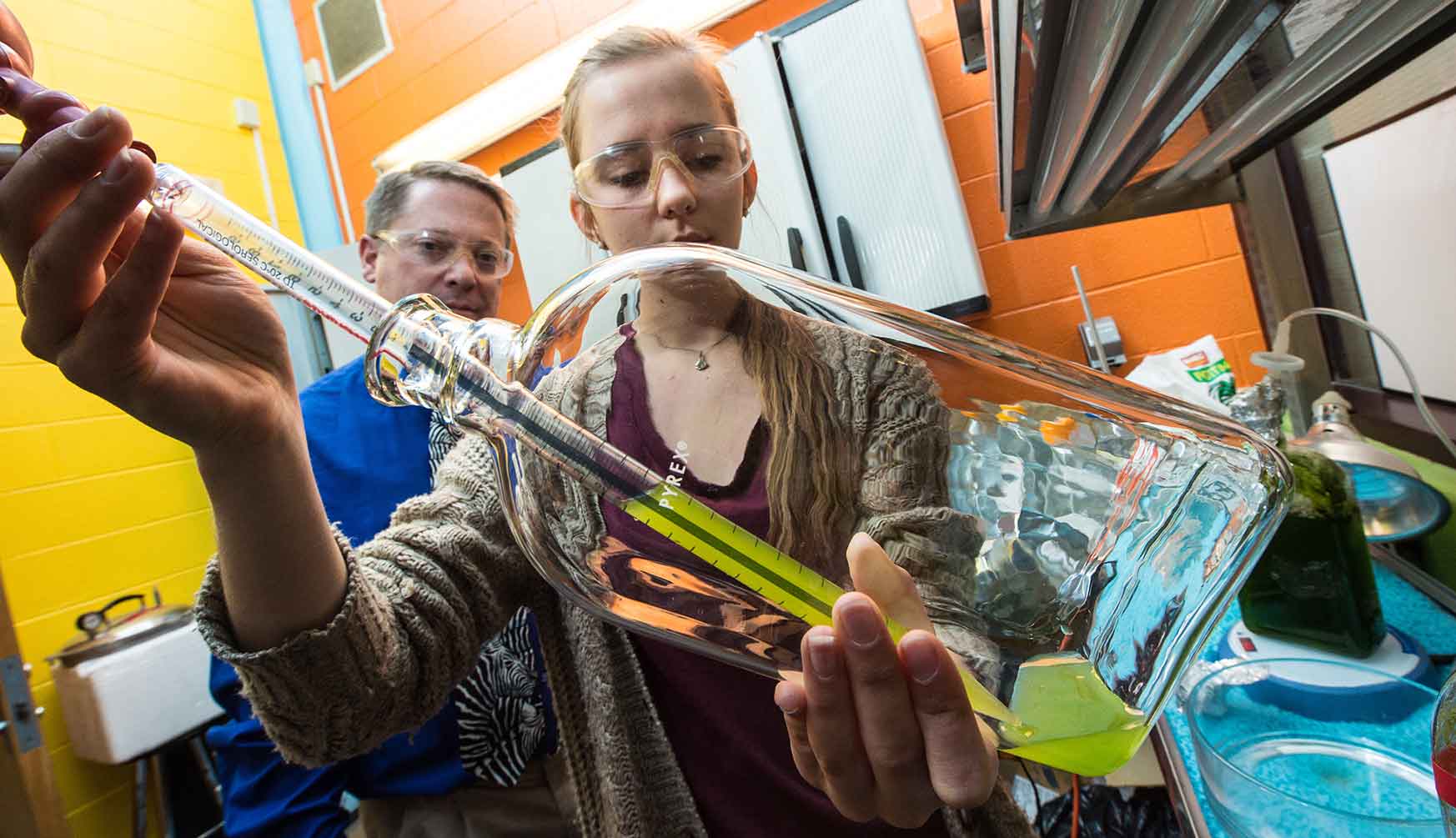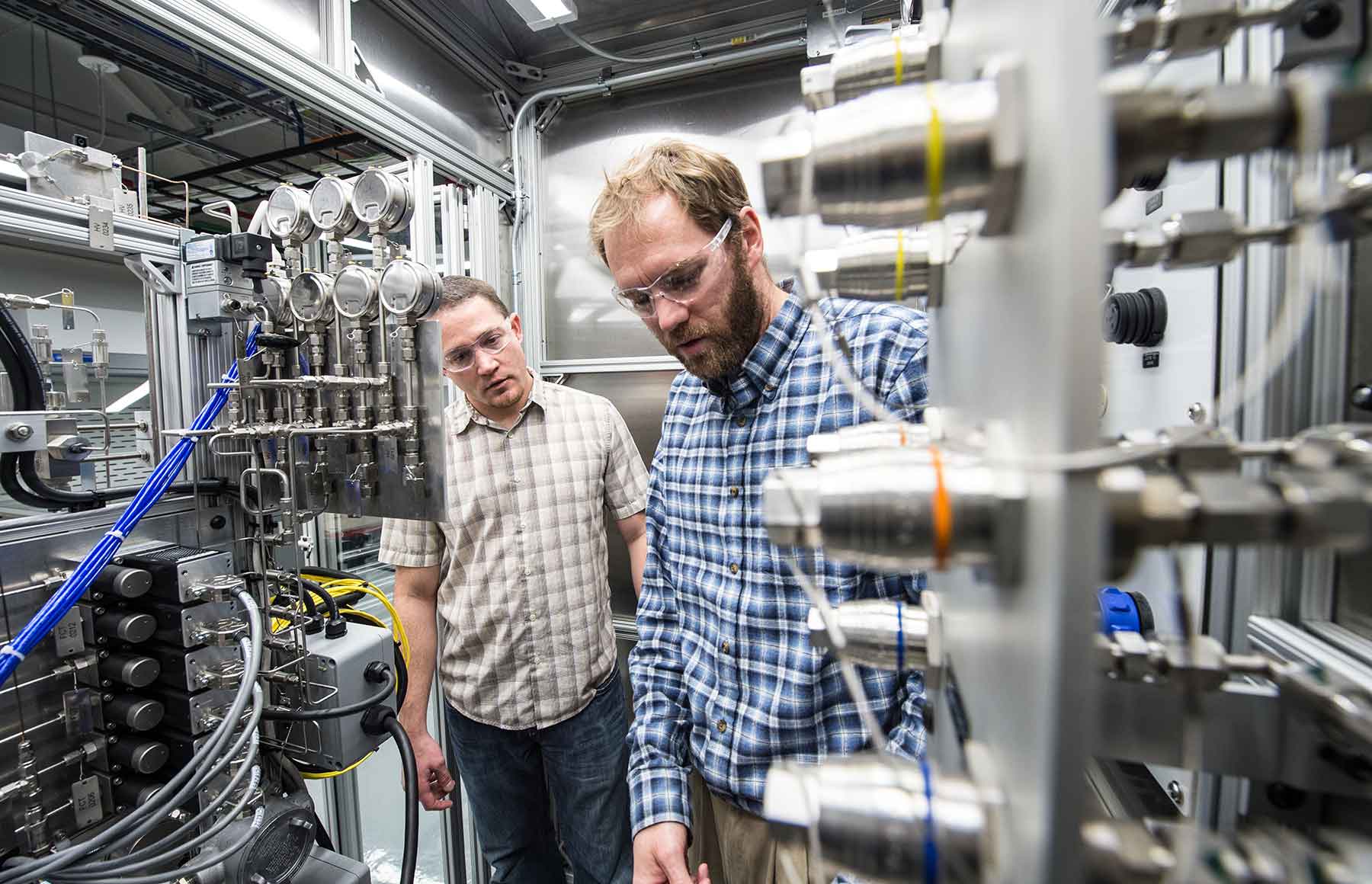Explore our collection of new stories for this topic.
Search or filter for a specific story using the options below.
May 2017
NREL Research Takes Off for International Space Station
Students at Chatfield High School are hoping their algal research yields energy in microgravity.
NREL Biorefinery Air Pollutant Emissions Analysis Explores Mitigation Options
A new study by NREL's Biofuel Air Emissions Analysis team describes the team's modeling of non-greenhouse gas air pollutant emissions for two feasibility-level biorefinery designs: (1) a biochemical technology pathway focused on biological conversion of cellulosic sugars and (2) a thermochemical pathway focused on fast pyrolysis of whole biomass.
News Release: New Method of Microbial Energy Production Discovered
For all living things to succeed, they must reproduce and have the energy to do so. An organism's ability to extract energy from its surroundings--and to do it better than its competitors--is a key requirement of survival. Until recently it was thought that in all of biology, from microbes to humans, there were only two methods to generate and conserve the energy required for cellular metabolism and survival.
February 2017
Co-Optima Targets Maximum Transportation Sector Efficiency, Energy Independence and Industry Growth
The National Renewable Energy Laboratory (NREL) released a new report that spotlights key accomplishments the first year of the U.S. Department of Energy Co-Optimization of Fuels & Engines (Co-Optima) initiative.
January 2017
Race for a Better Fuel Begins with NREL Researchers
Catalyst converts sustainable carbon sources into fuel for high-performance engines.
December 2016
News Release: NREL Scientist Maria Ghirardi Named AAAS Fellow
Maria Ghirardi, a scientist at the Energy Department’s National Renewable Energy Laboratory (NREL), has been named a fellow of the American Association for the Advancement of Science (AAAS). AAAS cited Ghirardi for "distinguished contributions to our understanding of photobiological hydrogen production in photosynthetic organisms."
November 2016
NREL Names Zia Abdullah as New Laboratory Program Manager for Biomass Program
Zia Abdullah joined the National Renewable Energy Laboratory (NREL) October 31 as laboratory program manager for NREL’s Bioenergy Technologies Office (BETO) program. Abdullah is an engineer with extensive experience and accomplishments in thermochemically and biochemically converting biomass to fuels and chemicals.
October 2016
News Release: NREL Researchers Discover How a Bacterium, Clostridium thermocellum, Utilizes both CO² and Cellulose to Make Biofuels
Scientists at the U.S. Department of Energy’s National Renewable Energy Laboratory (NREL) made the surprise discovery that a metabolic pathway to take up CO2 exists and functions in a microorganism capable of breaking down and fermenting cellulosic biomass to produce biofuels including hydrogen and hydrocarbons.
NREL Pilot Facility Co-Produces Bio-Derived Fuel Intermediates with Petroleum Refinery Infrastructure
The National Renewable Energy Laboratory, in collaboration with partners, recently built a unique pilot-scale facility that can co-produce biomass-derived fuel intermediates with existing petroleum refinery infrastructure. The plant combines biomass pyrolysis with fluid catalytic cracking to demonstrate the potential to co-process biomass-derived streams with petroleum at an industrially relevant pilot scale.
July 2016
R-Cubed: Assessing Commercial Viability of Biofuel Technologies
The National Bioenergy Center at NREL, with its extensive bioenergy research expertise and capabilities, is working to reduce costs and overcome technical barriers—an effort that will bring more bio-derived fuels and chemicals into the marketplace. A recent and significant step toward that goal is the retrofitting of a reactor system in NREL's Thermochemical Process Development Unit (TCPDU): the recirculating regenerating riser reactor or "R-Cubed."
Share
Last Updated May 5, 2025


